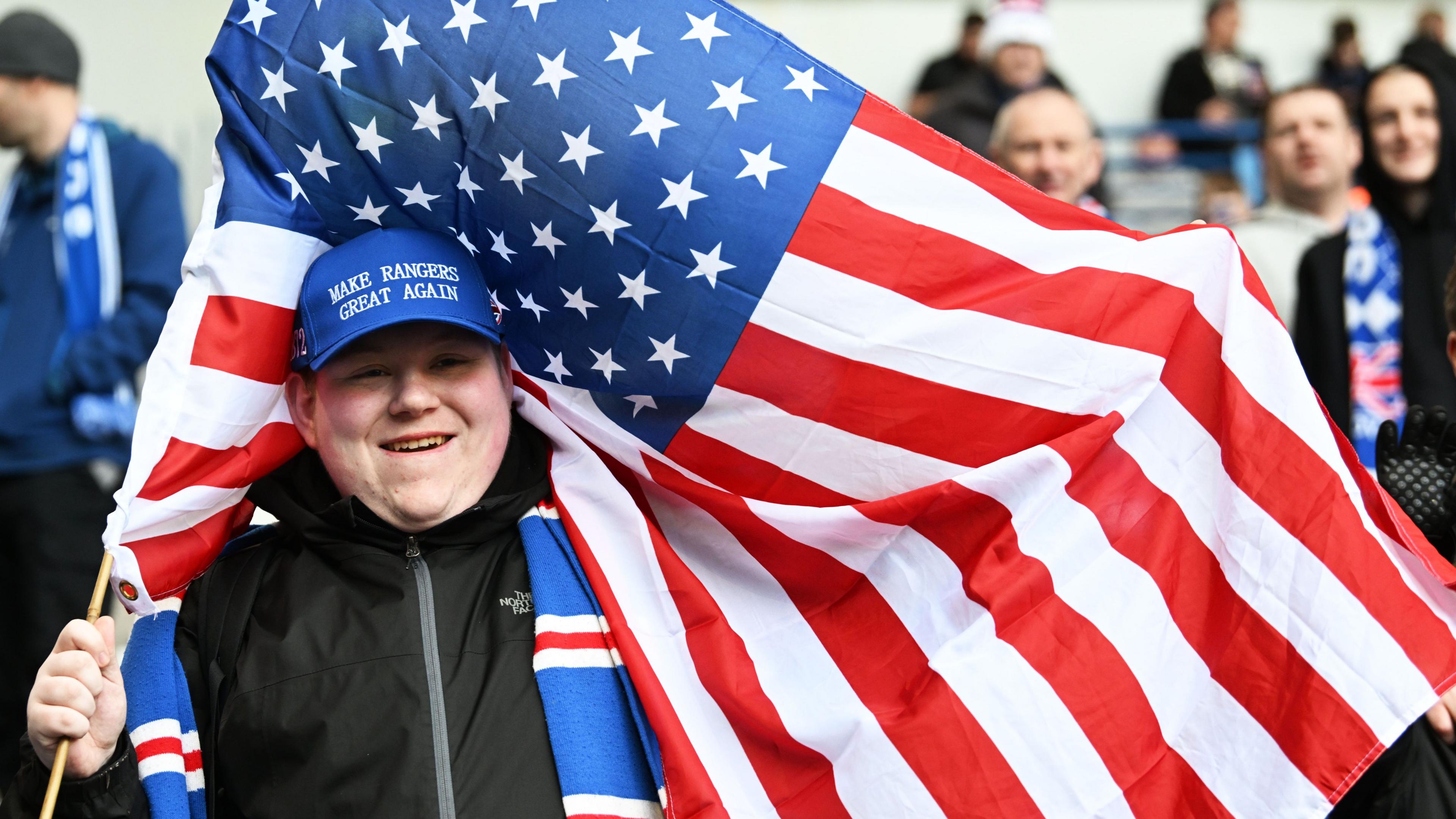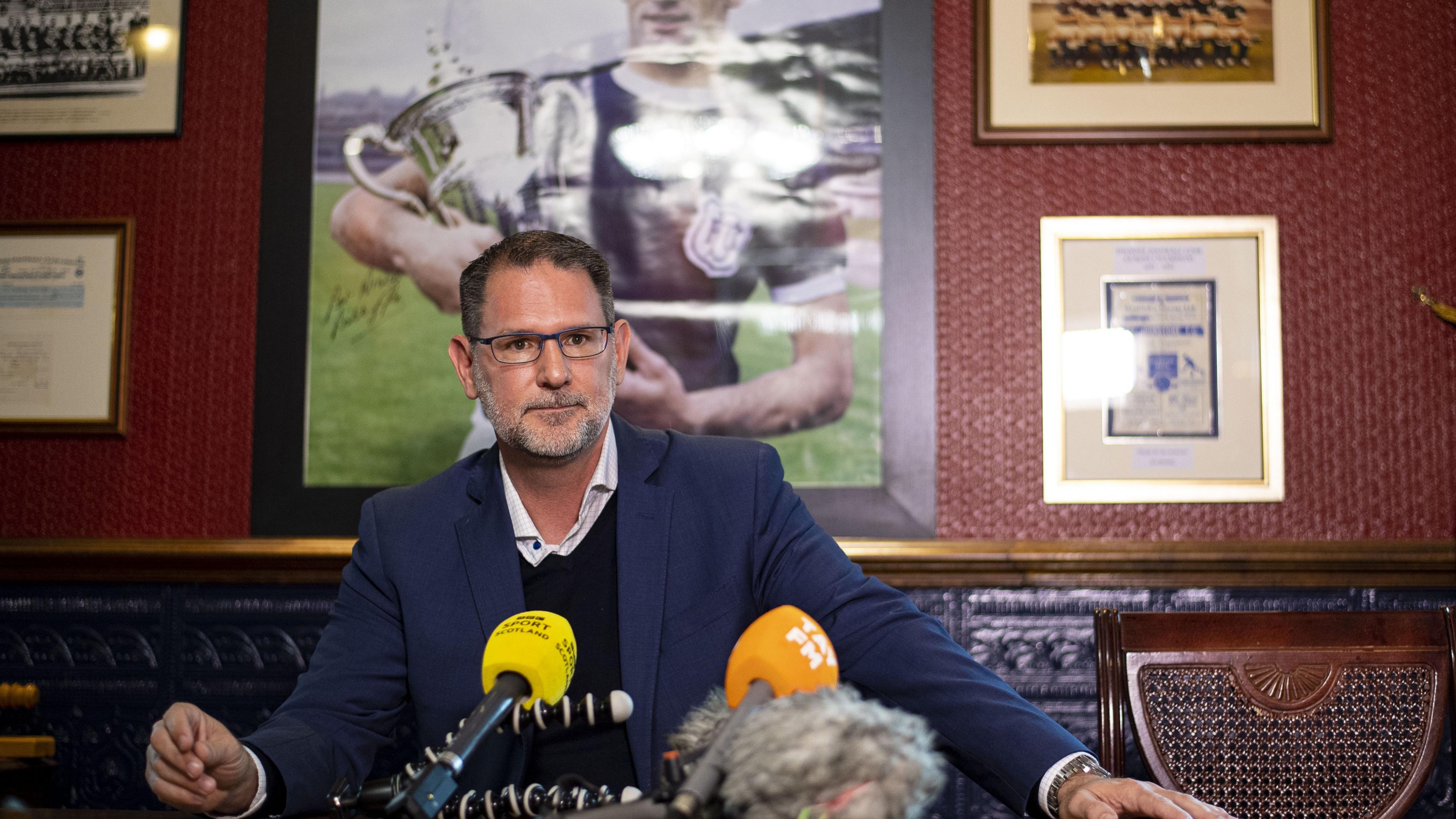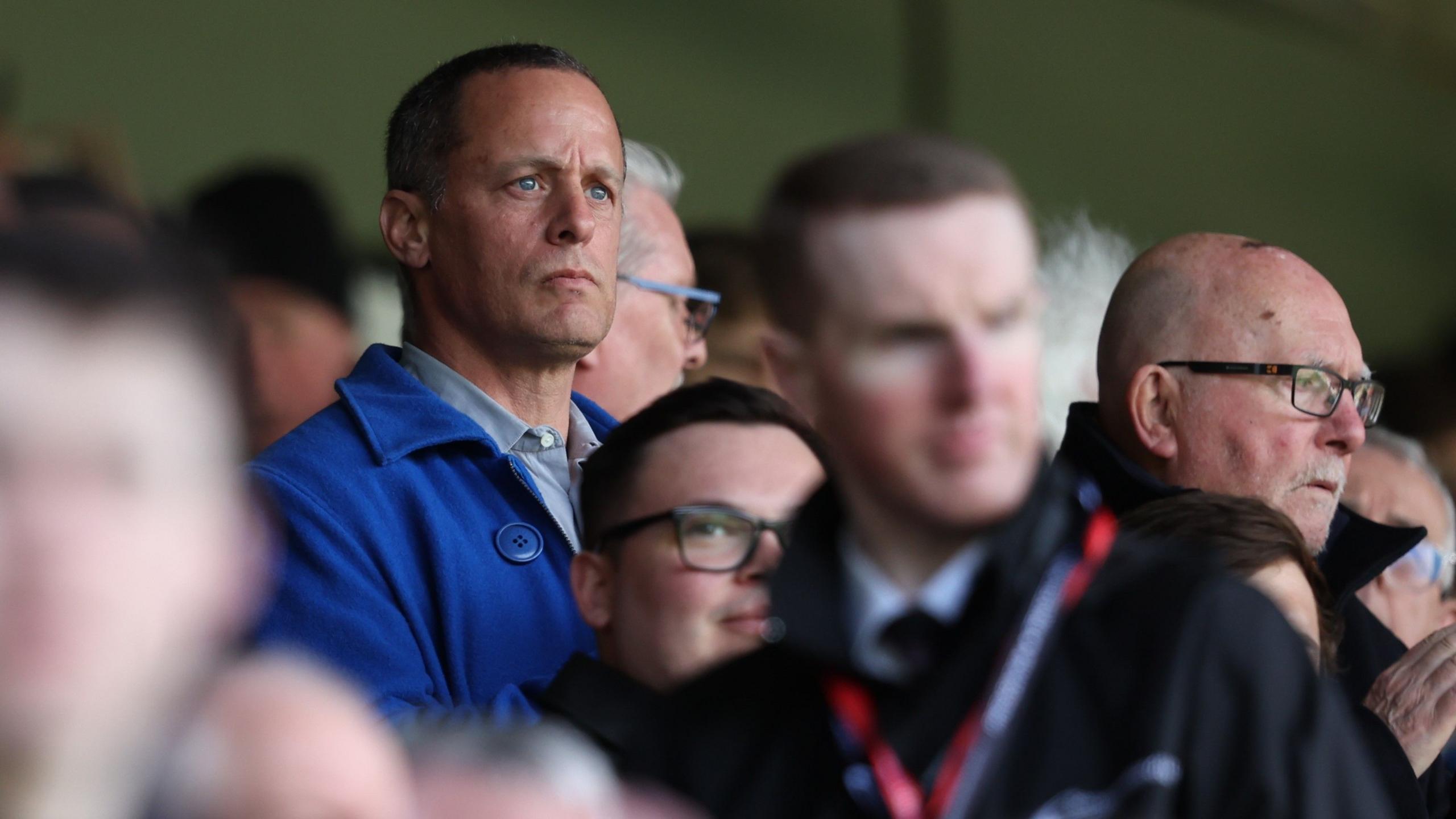Is America making Scottish football great again?

Rangers fans have embraced the Empire State of Mind of their new owners
Chris McLaughlin
BBC Scotland Sports News Correspondent
The American takeover of Rangers represents a significant shift at Ibrox but it also marks a broader milestone for Scottish football.
With the arrival of US-based consortium, including Andrew Cavenagh and 49ers Enterprises in Glasgow, half of this season’s 12 Premiership clubs now have substantial investment from the United States.
It’s the latest development in a trend which has been building quietly for over 10 years and one which reflects similar changes across Europe.
So, what’s driving this wave of transatlantic interest? And what might it mean for the future of Scottish football?
A decade in the making
American involvement in the Scottish game began back in 2013, when Texans John Nelms and Tim Keyes took control at Dundee, with a vision centred on youth development and player trading.
Five years later, across the road at Tannadice, Mark Ogren bought Dundee United. He has since invested an estimated £13m during what has been a turbulent but committed tenure.
Since then, the US footprint has expanded. Bournemouth owner Bill Foley acquired a significant stake in Hibernian, already owned by the Gordon family, St Johnstone were bought by businessman Adam Webb, and Aberdeen brought in a group of US investors via Scotland-born, US-based Dave Cormack.
Calvin Ford, the great-great grandson of Henry Ford, recently acquired a majority shareholding in newly-promoted Livingston.
More bang for your buck in Scotland than England?
In England, following Dan Friedkin’s acquisition of Everton in September, half of the 20 Premier League clubs are now under US ownership, including Manchester United and Liverpool. Nine more clubs in the English Football League have also attracted American investment.
The reasons are varied, but value is a key factor. While the average NFL franchise is valued at around $6bn, and an NBA team commands roughly $4.6bn, Everton reportedly sold for just £400m.
For investors used to those numbers, European football clubs can seem like a bargain – especially when they come with global brand recognition, loyal fanbases, and historical prestige.
But why Scotland?
“They love the sport and the cost for getting involved with sports ownership in the States is significant,” said Cormack, Aberdeen’s chairman.
Entry is cheaper, but the potential rewards – particularly through European competition – are very real. While Everton’s new owners may have limited expectations of reaching the Champions League, those backing Rangers will expect to be there regularly.
That offers a route to financial growth, global exposure, and an increase in brand value. There’s also a growing focus on player trading.
Celtic have shown how effective this can be, developing talent and selling at a premium. US investors see Scotland as a shop window.
Les Alan, an LA-based investment banker, helped broker the Rangers takeover and thinks the attraction was obvious.
“If you’re looking at the investment from a financial point of view, the figures speak for themselves,” he said.
“Rangers’ enterprise value is probably around £150m. For that you could probably buy a very small fraction of the 49ers, you could buy a fraction of an English Premier League club.
“Yet Rangers offer you one of the top two teams in Scotland, with a 38-acre training facility, a magnificent stadium in the heart of Glasgow and the possibility of top-tier European competition every year.
“So from a financial point of view, the comparisons I believe are compelling. In fact, in the US, here in LA, a women’s team just traded for $250m, without the background, the history or the trophy winning past of Rangers.”

John Nelms has been involved with Dundee for 12 years
The rise of multi-club ownership
The attraction and acquisition fits into a wider model now common across world football. Many American investors own more than one club – often across different countries.
Foley’s Black Knight group has stakes in Bournemouth, Lorient and Auckland. Webb holds a share in Cambridge United. Rangers’ new owners also control Leeds United.
Owners insist the goal is to share best practices, not necessarily move players around. But, for fans, there is unease. Supporters are proud of their club’s identity and traditions – and wary of becoming a satellite in a wider footballing empire.
Pride and passion won’t allow fans to entertain the notion of their club existing to feed the parent company’s bigger offspring but with scouting and analytics playing such a key role in football, collaboration in some form is inevitable.
“Every team is just as important as the next team but we need to have ways of avoiding the heavy transfer payments that you have in football and at least if you have transfer payments, we’re paying ourselves instead of paying a third party,” said Foley.
“So, I understand sometimes there’s apprehension about multi-club ownership – Manchester City has proved it works for them and we feel it works for us with the size of club we are and we respect every team that we own a part of.
“I was only allowed to buy 30% of Hibs but if larger ownership percentages are allowed, you’ll see many more Americans investing in Scottish football. I have no doubt about that.”
With great power comes great responsibility
What evidence do we have of success so far?
Dundee have yet to realise the dream of becoming a conveyer belt for young Scottish talent, but their US owners have brought stability to a club that was unpredictable.
Their neighbours at Tannadice have steadied the club financially, but fans might be forgiven for expecting more. It’s perhaps a similar story at Hibs, and St Johnstone’s new owners couldn’t prevent the club being relegated for the first time in 16 years.
We also have to acknowledge when fans didn’t welcome fresh investment from the US. In 2024, Motherwell fans, the club’s majority shareholder, voted against a club takeover by the Barmack family.

Fans did not agree with Erik Barmack’s vision for Motherwell
The episode at Motherwell shows there are also cultural differences to navigate.
In the US, sport is often positioned as entertainment – a product consumed by families, sponsors, and corporate clients. In Scotland, football is deeply personal.
American investors entering the Scottish game may find the passion and expectations here very different from what they’re used to. And while financial backing is welcome, it comes with a responsibility – not just to balance the books, but to honour what the club means to its supporters.
“Each club has different but deep histories no matter if you’re Stenhousemuir or Rangers,” said Alan.
“If we’re out there in the investment banking world and you’re selling two semi-conductor companies, how do you differentiate from the two? But football clubs, even in the same league, have deep and different cultural pasts.”
Scottish football may benefit from US investment. But if it’s to succeed, it must be done with care, respect, and a clear understanding of the culture it’s entering.







